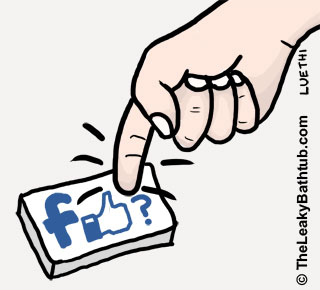
There’s been a lot of discussion on various blogs recently about the effectiveness of social media versus other marketing channels.
Here’s the reality of Facebook pages for small businesses (especially for businesses in a service industry)…
1. People don’t “like” the stuff they really like
In real life, people like all kinds of products: things which make their lives easier, but the products are boring and far from glamorous.
You know, things like deodorant. Sunscreen. Dog food. I know that personally I have lots of products I love… but do I like them on Facebook? Well, to be honest, I don’t even know if these products have a Facebook page.
It probably wouldn’t be ‘cool’ to like a Page about toilet roll or deodorant, so we tend to like the Pages we don’t mind our friends knowing about.
Therefore for many of us our public/Facebook persona isn’t a true reflection of our real-world behaviour. And as a marketer, you need to be aware of the differences in reality versus Facebook!
(See: http://www.clickz.com/clickz/column/2189690/why-marketers-are-missing-the-point-of-social-media)
Learnings from this article:
- You need to have a goal for your Facebook page.
- Facebook is a good medium for adding value to your business activities, or as a customer service tool.
2. Email marketing is far more effective than Facebook for business-to-business services
(See: http://blog.kissmetrics.com/email-crushes-social-media/)
Learnings from this article:
- If you’re in a business-to-business industry, email communications are king.
- In my view, the article is right, email marketing is the more powerful than Facebook for business-to-business marketing. But: (a) LinkedIn can offer many benefits for business-to-business marketing; and (b) Facebook can still be a nice add-on; a way to interact with your raving fans in between newsletters.
3. Facebook and email are equally valuable when communicating with teens
(See: http://www.aweber.com/blog/email-marketing/teens-communicate-infographic.htm)
Learnings from this article:
- Facebook and email marketing are equally popular with teens.
- With email marketing campaigns, it doesn’t matter what time of day you send your message.
Hmmm, interesting! A colleague in the US said to me that this does not align with his experience at all. He coaches a teenage sports team, and the players have to be consistently reminded to check their emails. And he points out that this study was sponsored by an email marketing company (AWeber) so it’s worth taking these findings with a pinch of salt!
4. Pinterest users don’t buy
Okay, so this has nothing to do with Facebook at all, but there’s been so much hype around Pinterest, the new kid on the social media block, that I wanted to include a mention of this.
(See: http://www.forbes.com/sites/jjcolao/2012/07/13/new-data-shows-pinterest-users-look-but-dont-buy/)
Learnings from this article:
- Pinterest can drive web traffic. But:
- Pinterest has lower conversion rates than Bing, Google, Facebook, and Twitter.
My trials of Pinterest to date back this up: I’ve been pinning via two different Pinterest accounts, and can attribute zero sales to Pinterest at this stage! Whereas search engine traffic, Facebook and Twitter does convert.
Also, I get far more website traffic from Facebook and Twitter than from Pinterest. The Facebook visitors are the most engaged, i.e. they spend more time on my websites than Twitter users.
Again, I’ve been testing this for two very different websites: for one, I’ve been doing more Facebook activity; and for the other I’ve been doing more on Twitter. Yet the results are almost identical in both cases, i.e. there’s more traffic from Facebook than from Twitter, and Facebook users stay on my sites for longer.
My Facebook Page tips for small businesses in a service industry…
- You need to have a goal for your Facebook page: whether you’re a business-to-business or business-to-consumer company.
- Facebook is a good medium for adding value to your business activities, by providing links to interesting articles etc. linked to your industry.
- Facebook is also a useful customer service tool: but that means you must check your Facebook page (and messages) regularly, and respond promptly.
- If you’re in a business-to-business industry, email marketing and email communications are king. Focus on (a) growing your own opt-in list first and foremost, and (b) be sure to communicate regularly with your list.
- Facebook is a great way to interact with your raving fans in between newsletters.
- If you are business-to-business company, see what benefits you can leverage from LinkedIn. If you need some tips on getting started, check out this article: http://www.copyblogger.com/linkedin/
- If you’re a service-based business, don’t be tempted to buy “likes” by running a competition offering a holiday to Fiji or an iPad or whatever the gadget of the day is. Why? It’s unlikely that these people turn into customers. It is better to have quality fans than a vast quantity of fans who never interact with you.
- Promote your Facebook page in the real world too. For example at networking events, on your business card, signage in your premises, etc.
- If Facebook does make sense for your business as a customer retention tool, post 2-3 times a week (no more than once daily). Keep the content interesting and varied. Mix things up a bit, by posting article links, photos, videos, and so on. That might take you 10-30 minutes a week. Is that worth it to keep in touch with your raving fans? Yes, I reckon so!
- Using Facebook as a way of seeking new customers will take more time and more financial resources. And there may well be other marketing channels that offer a better return on investment, so make sure you crunch some numbers (such as a break-even analysis) first and foremost.



